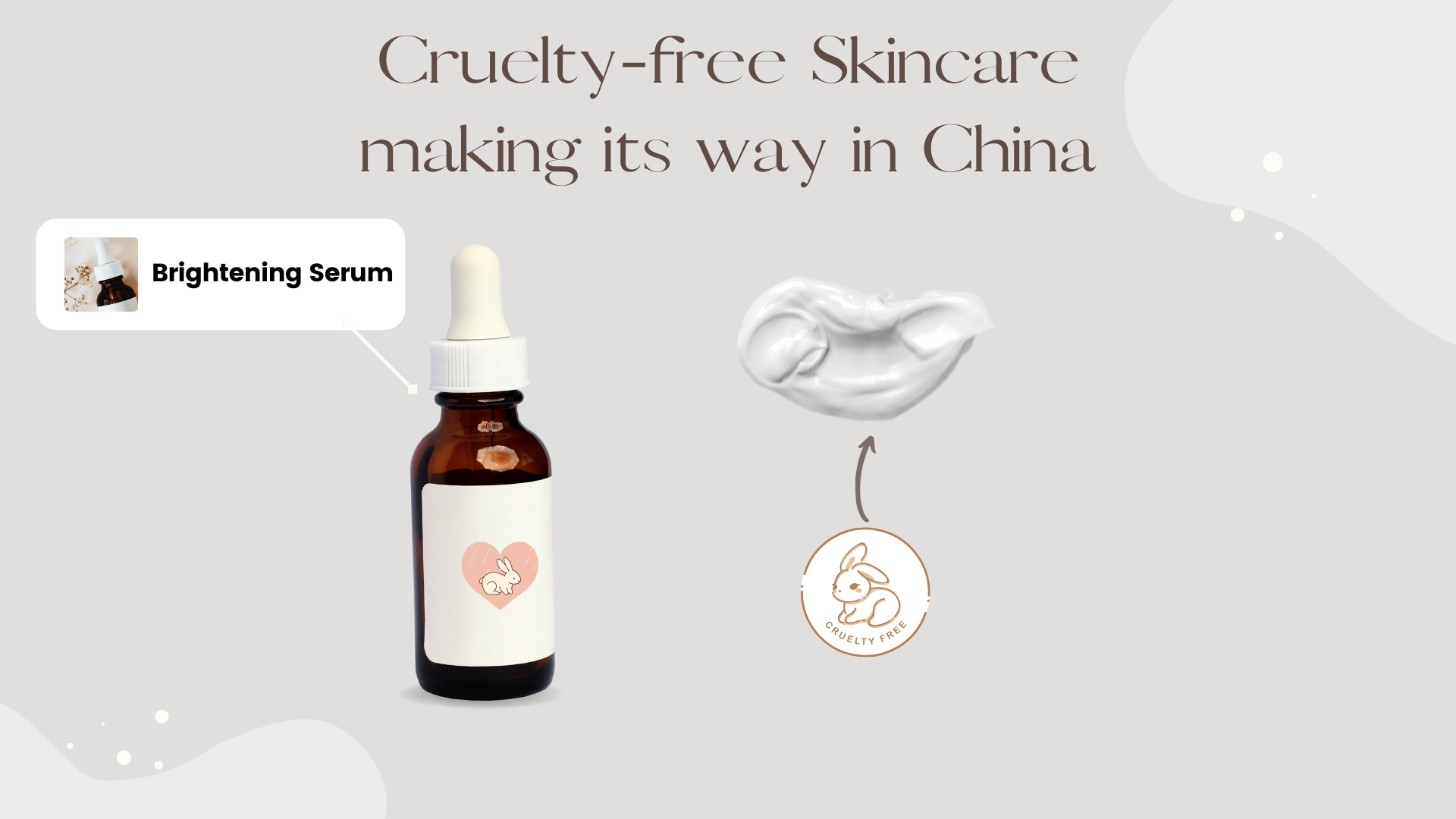China is currently the largest and fastest-growing market for cosmetics and skincare products. However, it has been known to require animal testing for imported cosmetics products. This has raised concerns among consumers who are increasingly seeking cruelty-free skincare options.
Cruelty-free skincare refers to products that are not tested on animals and do not contain any animal-derived ingredients.
This movement has gained significant traction as more people are recognizing the significance of ethical and sustainable beauty practices in the Chinese beauty market. In recent years, there has been a positive shift in China’s stance on animal testing for cosmetics. The country is actively working towards reducing the requirements for such testing and is also focusing on establishing alternative methods and verification institutions.
The Cosmetics Industry in China
With Chinese cosmetics being the second largest industry in the world, it is one of the most attractive and popular destinations for foreign brands that want to expand their activities overseas. Indeed, cosmetic products are now part of Chinese consumers’ daily life. Consumers’ demand for eco-friendly products has also increased these past few years.
In China, more women are joining the workforce, thus driving the instinct of looking good in the workplace. Moreover, the cosmetics industry has also witnessed a surge in demand among men. In fact, genderless cosmetics (and fashion) are one of the biggest trends in today’s China, especially when we’re talking about the skincare market.
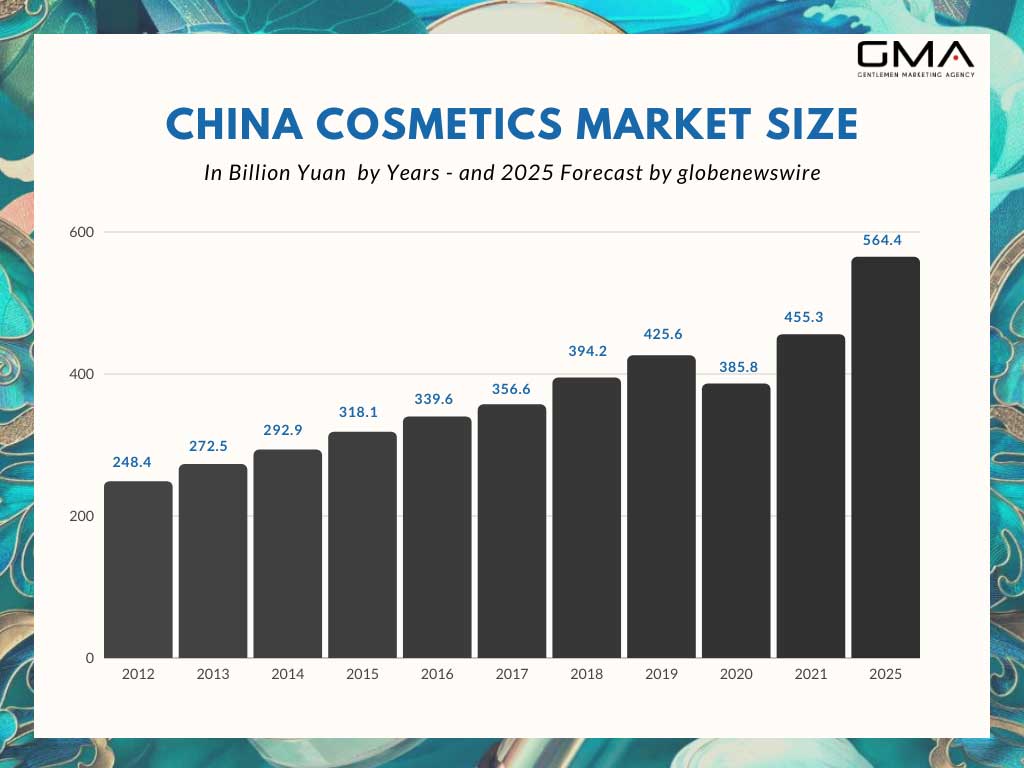
The Skincare Market in China
In China, the skincare segment is the biggest and fastest-growing one within the Beauty & Personal Care market. With other segments such as haircare, fragrances, and color cosmetics, the Chinese skin care market has experienced double-digit market growth. Even though foreign brands tend to be more popular than domestic ones, this success benefits both Chinese and foreign companies.
If Chinese consumers tend to prefer foreign international brands over domestic brands, it’s because this can be explained by the fact that China had a lot of product scandals in the past, and foreign products are submitted to stricter regulations to enter the Chinese market.
Due to the popularity of skincare products from Japan and South Korea as well as natural ingredients that are particularly appreciated, skin care revenues will continue to increase steadily. Chinese people want healthy and nourished skin and they are willing to pay a lot for imported skincare products.
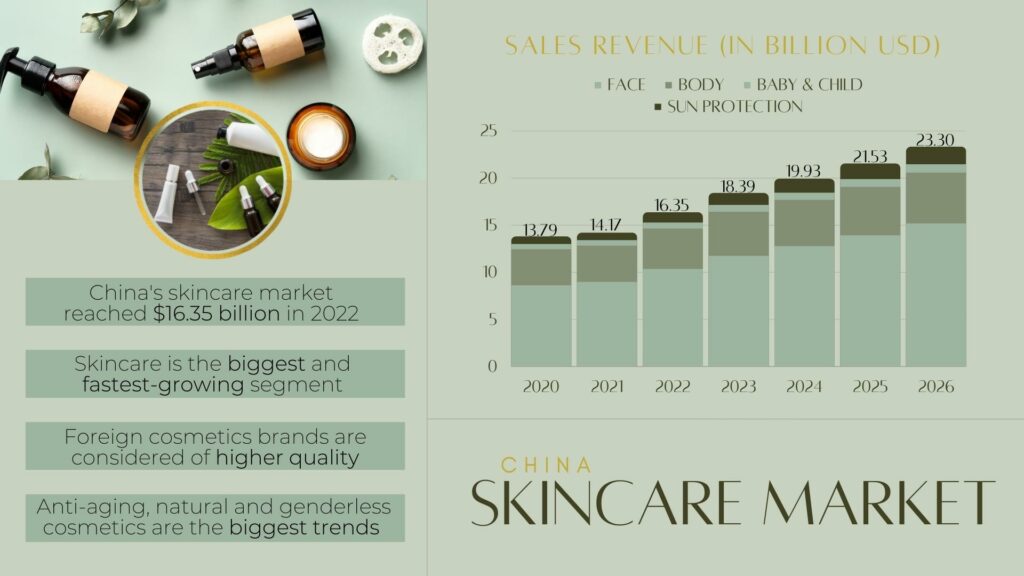
In 2020, the revenue generated by the skincare industry in China reached 13.79 billion dollars, and in 2022 it was already $16.35 billion. It’s expected to reach 23.30 billion dollars by 2026, with an annual growth of 8.78% between 2021 and 2025. As you can see above, anti-aging, natural and genderless cosmetics are the biggest trends in the Chinese skincare market.
The Cruelty-free Cosmetics Market In China
The cruelty-free cosmetics market in China has been witnessing significant growth in recent years. With the increasing awareness about animal rights and the harmful effects of animal testing, more and more consumers in China are opting for cruelty-free cosmetics. This market segment offers a wide range of products, including skincare, makeup, and haircare, that are not tested on animals.
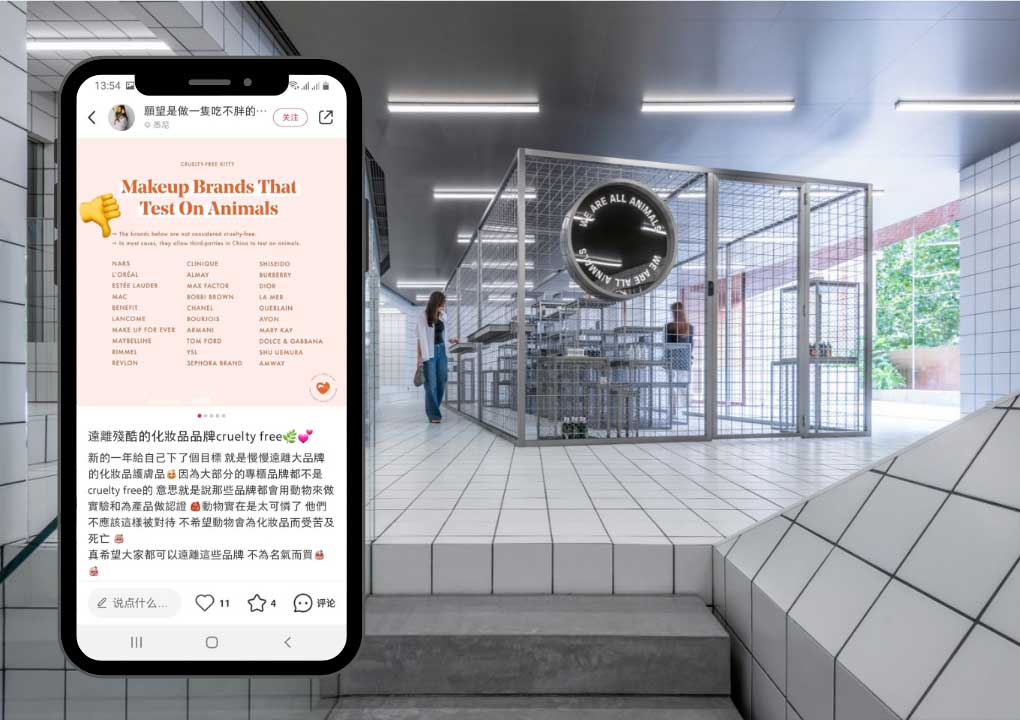
The market is valued at over 26 billion dollars and presents a great opportunity for marketing managers to tap into the rising consumer demand for ethical beauty products.
This trend has been supported by the Chinese government’s efforts to encourage ethical practices in the beauty industry. However, it is important to note that navigating the cruelty-free cosmetics market in China can be challenging due to regulatory requirements.
Mandatory animal testing for all foreign cosmetics imported into China
While some cosmetics manufactured in China are able to skip animal testing, all foreign cosmetics imported into China must undergo animal testing in order to be sold there. Therefore, when a beauty brand enters the Chinese market and sells its products in China it loses its cruelty-free status.
Even if your cosmetics have been tested overseas, you still need to send your cosmetics to a designated NMPA testing institute in China for testing.
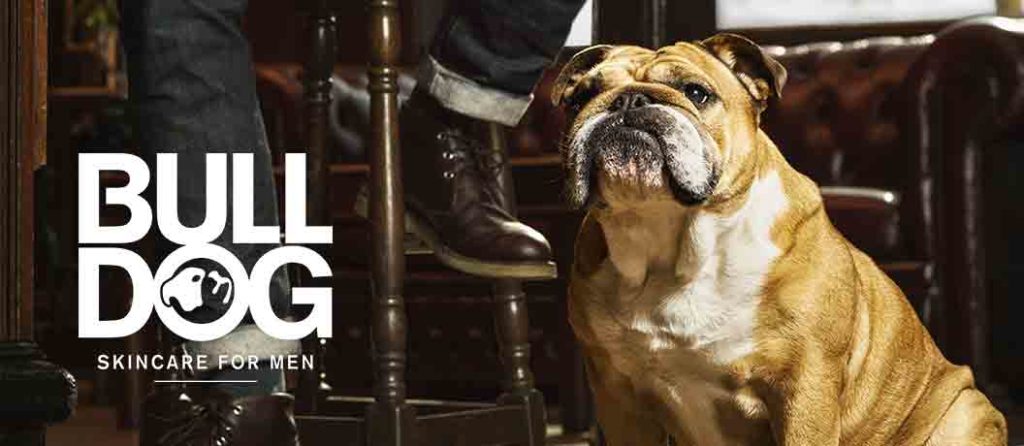
For all cosmetics, hygiene safety tests are mandatory. Tests might include sanitary chemical tests, microbiological tests, toxicological tests, and human safety tests.
Once brands have completed the long registration process, which includes animal testing, they are able to sell anywhere in China, such as in retail stores, department stores, online, and apps.
The mandatory animal testing law in China it’s a safety measure to ensure that no harmful cosmetics will be sold in China. Anyway, it’s cruel and obsolete!
Major global cosmetics brands have given up their Cruelty-Free status to sell in China
The stakes of losing potential sales in China mean that many brands are unlikely to protest the country’s current animal testing policies.
Currently, all imported products that are physically sold in retail shops in mainland China must go through animal testing according to Chinese law. This means that major global brands like L’Oreal, Estée Lauder, Lancome, and others have given up their Cruelty-Free status in order to sell cosmetics in the Chinese market.
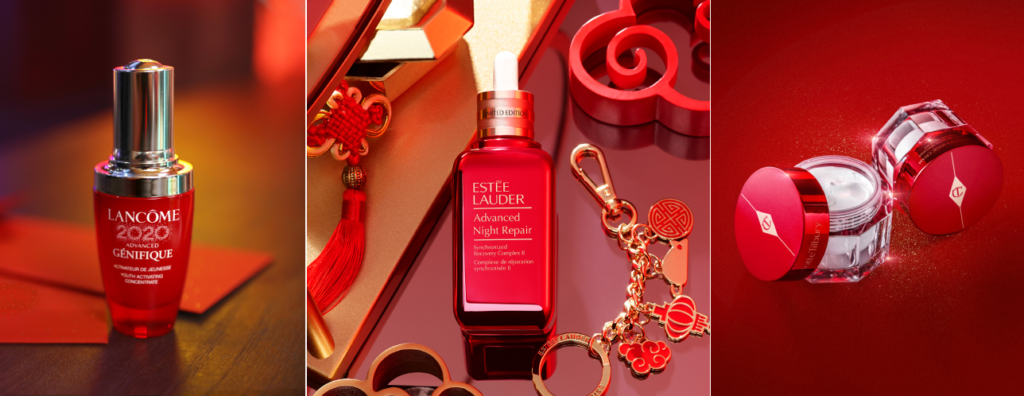
Just a few brands avoid this process by selling their products online via cross-border e-commerce such as Charlotte Tilbury Beauty and Lush.
How to avoid the animal testing process and still sell cosmetics in China?
Some cosmetics made in China are capable of skipping animal testing
As we said before, all foreign cosmetics imported into China require animal testing, while some cosmetics manufactured in China are able to skip it. Local brands have not had to undergo animal testing since 2014.
So, if you are an international brand, and you are willing to manufacture your products in a Chinese factory within mainland China, you do not need to undergo animal testing.
However, it does not include what is termed special use cosmetics, such as hair dyes, hair perms, whitening products, sunscreen products, anti-hair loss, and products with new efficacy which have to be tested on animals even if they’re manufactured in China.
In fact, cosmetic products are classified as special cosmetics and general cosmetics. Other than those mentioned above fall under general cosmetics.
Cross-border e-commerce is a common way to skip animal testing
If you sell online in China through cross borders e-commerce platforms like Tmall Global, JD Worldwide and Kaola, the products only get sent into China once the consumer has placed the order, which means that brands can avoid animal testing.
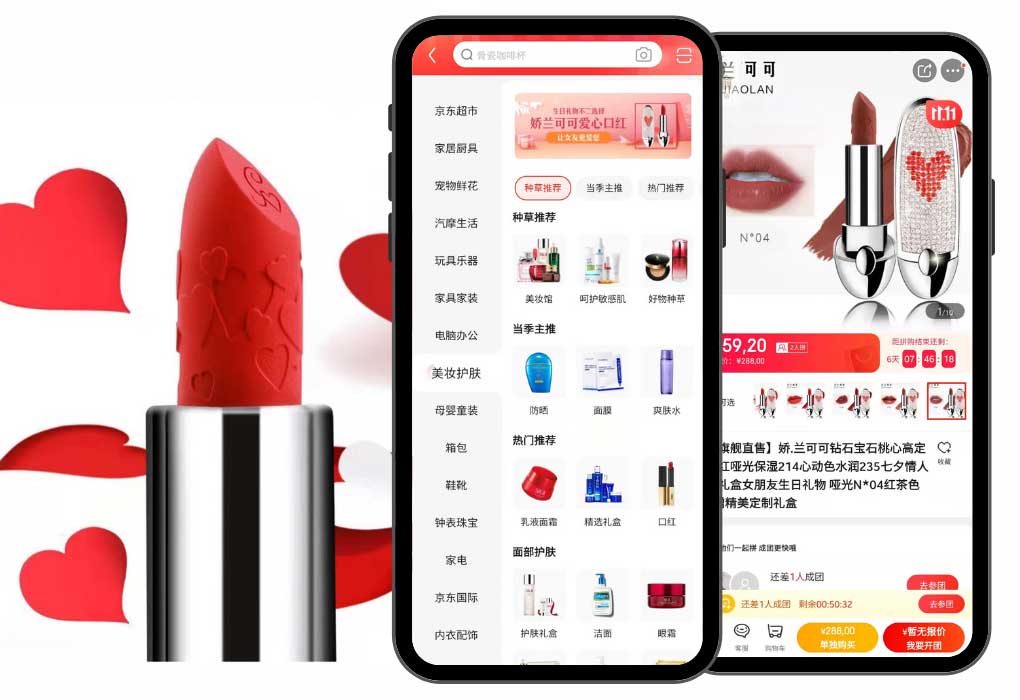
This is the example of the brand Lush which is Cruelty-Free.
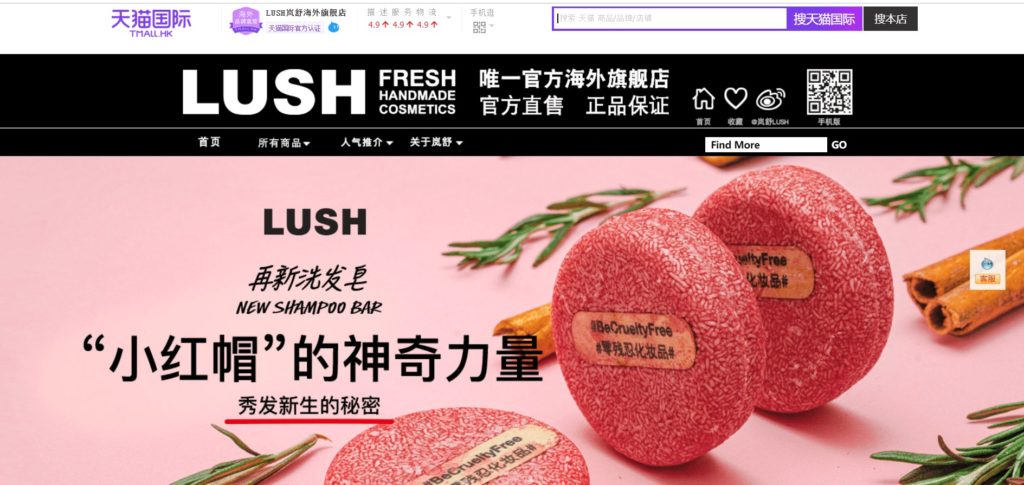
Also, The Little Red Book (RED), is a Chinese social media and one of the world’s largest community e-commerce platforms. Over the years, it has grown to become China’s foremost shopping platform in terms of beauty, fashion, and luxury products.
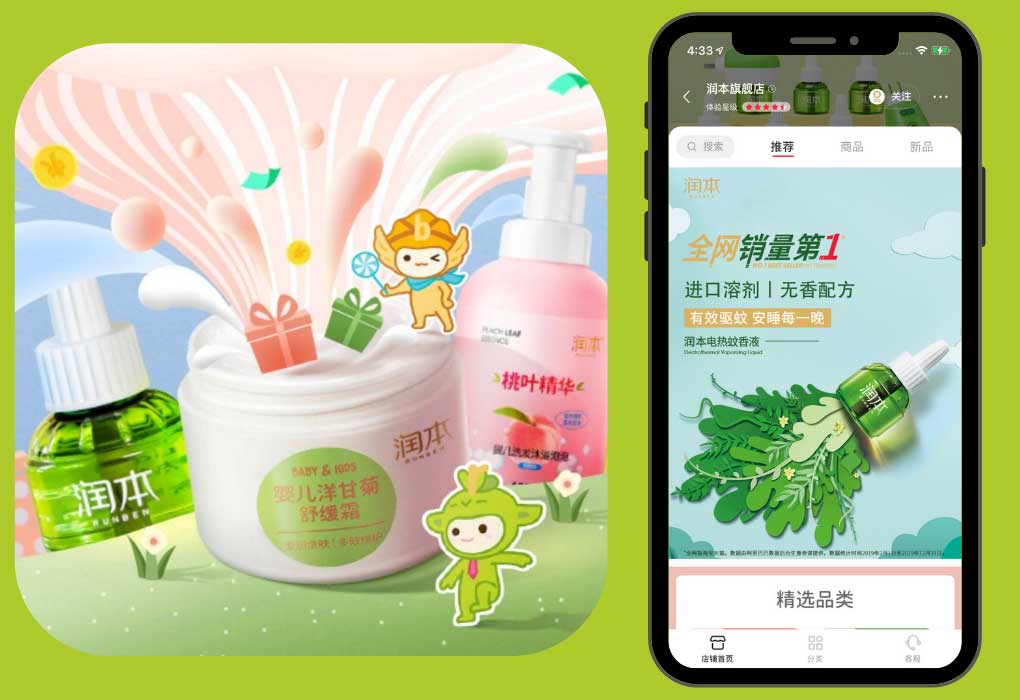
What are the latest updates about animal testing regulations?
Is it the end of animal testing for non-special use cosmetics?
China State Council released the final version of the long-awaited Cosmetics Supervision and Administration Regulation (CSAR) in June 2020. The new regulation will come into force in January 2021. However, CSAR does not provide any explanation regarding mandatory animal testing in China.
According to the previously published draft Administration Measures for Filing of Non-Special Use Cosmetics, general cosmetics will no longer be subject to mandatory animal testing, whether they are produced domestically or imported into China.
The Leaping Bunny China pilot project allows foreign cosmetics to be sold without animal testing
As a result of the collaboration between CFI, Knudsen&CRC, and Fengpu Industrial Park, the Leaping Bunny China Project will allow foreign companies to avoid animal testing when selling on the Chinese market.
To secure that no animal test has been involved in the Leaping Bunny China Pilot Project, the project involves local manufacturing of foreign cosmetics combined with strict supervision of the mandatory safety assessment tests.
The partnership with oriental Beauty Valley in the Fengxian Industrial Park provides an additional safeguard of the process as manufacturing and testing will take place within this cosmetic manufacturing supervised by Knudsen&CRC. Bulldog skincare was one of the first companies to take part in the Leaping Bunny China Pilot Project.
How does the Leaping Bunny China Pilot Project work?
- The brands manufacture in a specific district in China under the supervision of Knudsen&CRC.
- Products are then sold within Shanghai and other key districts.
- These products can also be sold directly to end consumers via Chinese e-commerce platforms like Tmall and JD.
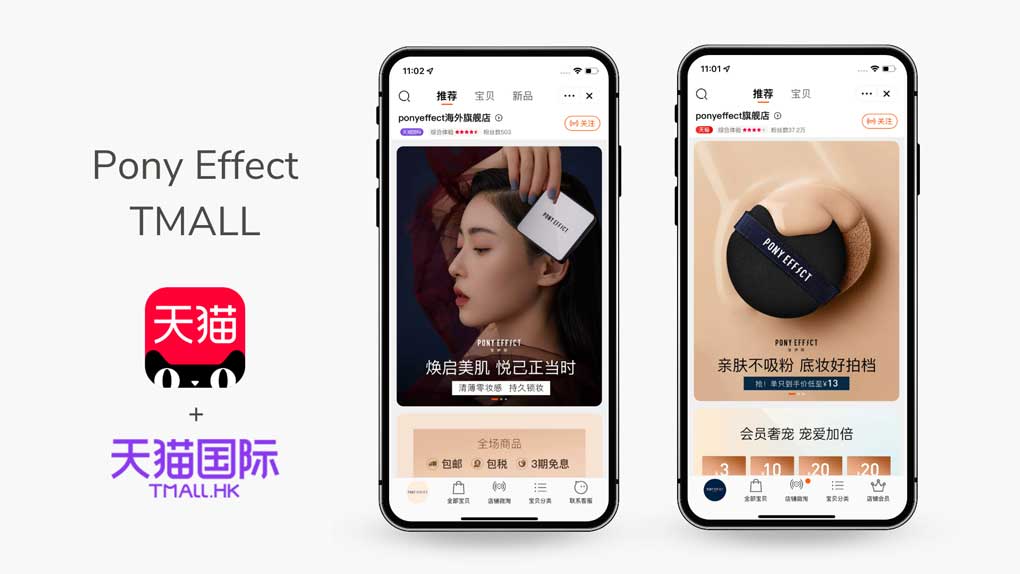
Chinese consumers are increasingly demanding cosmetics without animal testing and this unique, ground-breaking project will enable those consumers to buy great cruelty-free products.
Bulldog Skincare was the first certified Cruelty-Free brand to sell in China
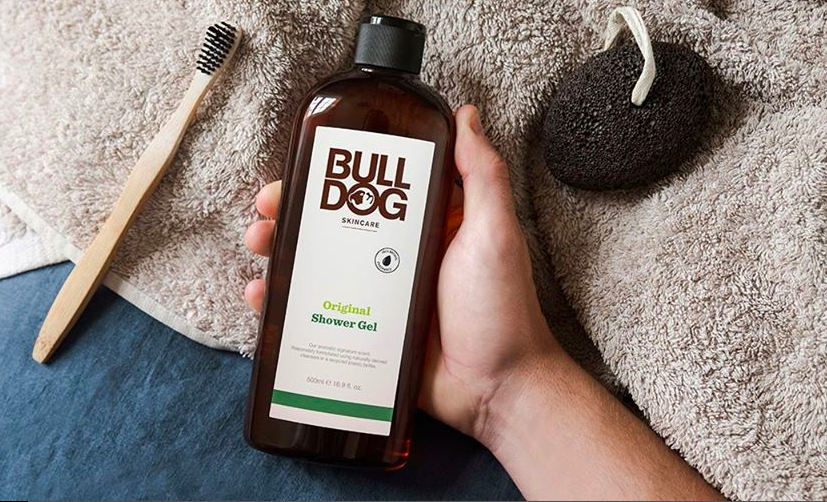
Bulldog Skincare ethical and responsible practices
Bulldog Skincare for Men was launched in 2006 by two friends, Simon Duffy and Rhodri Ferrier, in London. The brand’s strategic lines for normal, sensitive, oily, and mature skin are specially formulated to help men look and feel their best.
Even though cosmetics and skincare products were at first mainly used by female consumers, male consumers are now more inclined to use cosmetics as part of their daily routine.
Bulldog never uses ingredients of animal origin and the brand is certified by Cruelty-Free International. Bulldog Skincare has had a long track record for ethical and responsible practices and its focus on animal welfare was also particularly evident in its entry into the Chinese market.
Bulldog Skincare took part in the Leaping Bunny China pilot project
Bulldog was one of the first companies to take part in the Leaping Bunny China pilot project, entering the Chinese market without animal testing on its cosmetics. It resulted in a special agreement to allow Bulldog to manufacture in the United Kingdom, fill the products in Fengxian, and sell its products in stores within Shanghai.
This means that throughout the entire supply chain and production line, Bulldog’s products will not face animal testing.
Bulldog Skincare has become the first international company to maintain its cruelty-free commitments while on sale in mainland China. This marked a major step forward in China, home to the most dominant market for beauty and cosmetics.
With their major leap in China underway, Bulldog hopes that the “success of this scheme will pave the way for more international cruelty-free brands to sell there.”
Will China stop the animal testing process to sell cosmetics there?
China remains of the few major markets in the world to require mandatory and regular animal testing on cosmetics. There are other methods to ensure that no harmful cosmetics will be sold in China, therefore we hope that China will declare it illegal as soon as possible. Recent updates make us hope in a positive way!
If you are a beauty brand that is looking to enter China and you would like to learn more about how to enter the Chinese market and how to promote and sell products there, contact us!
GMA provides a wide choice of marketing and promotion solutions to help you grow your business in China. We offer a complete panel of solutions: digital, marketing, and distribution services for consumer goods, beauty, cosmetics, healthcare products, and fragrance.
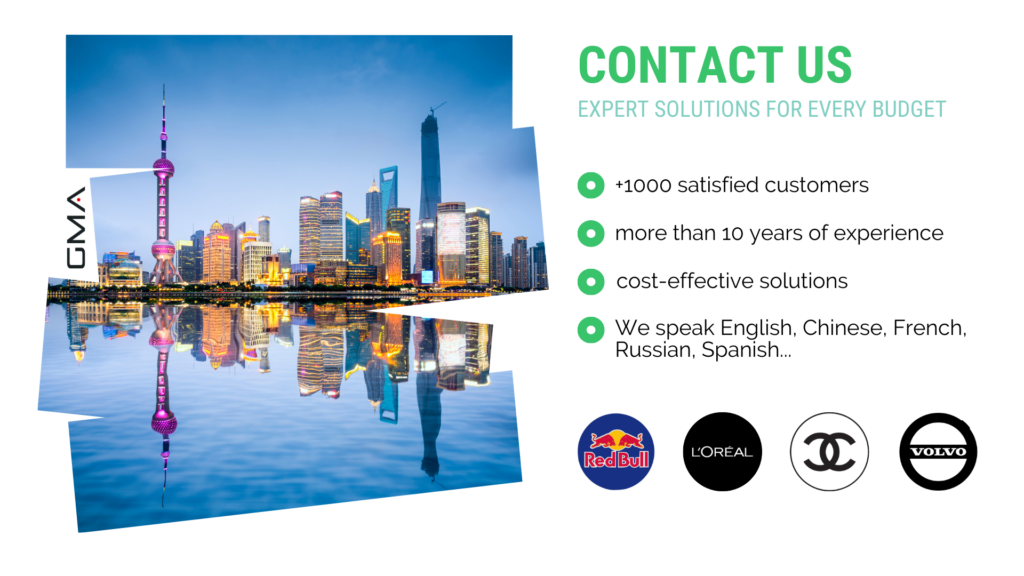
Collaborating with an agency specialized in the Chinese market is the best way to achieve your goal and increase your Return On Investment. As all companies are different, the marketing and advertising strategy must be tailored according to their needs and within their financial means.
Proud of the success of the companies we have helped over the years, we know exactly what a certain company needs.
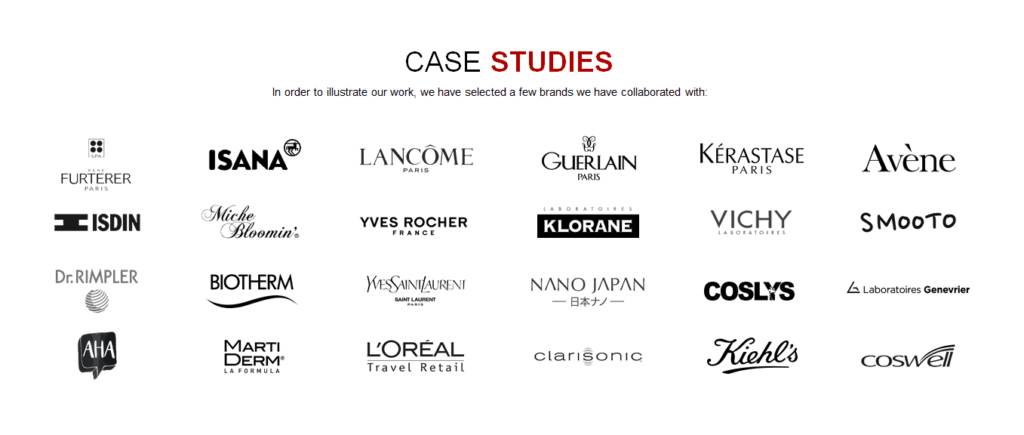
Thus, if you have questions about selling, advertising, exporting, etc. your cosmetics in China, contact us directly, and we will reply to you within 24 hours.

